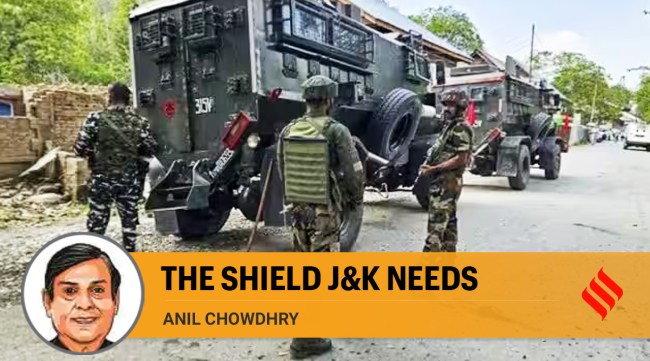Opinion Jingoism cannot protect Jammu and Kashmir
We need greater vigilance, stronger security infrastructure, not jingoism
 Army units deployed in the Kashmir Valley have limited access to reliable humint for obvious reasons. They come from different regions and lack knowledge of the local language, ethos and terrain. (Express File Photo)
Army units deployed in the Kashmir Valley have limited access to reliable humint for obvious reasons. They come from different regions and lack knowledge of the local language, ethos and terrain. (Express File Photo) The nation continues to mourn the killing of the brave uniformed forces officers in an encounter with two Lashkar-e-Toiba (LeT) terrorists near a village in Anantnag district of South Kashmir in the second week of September.
According to reports, the joint contingent of the Army and police was in hot pursuit of terrorists in a deep forest area on a cliff when they were ambushed/trapped by their assailants. The search operation for the LeT terrorists was apparently launched based on intelligence input. Since it was a joint operation of the Army and police, it’s not known who provided this input.
Having dealt with militancy on the ground in Kashmir and remotely from Delhi for a Central Intelligence Agency and MHA for almost a decade, I have a fair idea of the challenges of conducting anti-terrorist operations in deep forest mountainous terrains. Two kinds of intelligence inputs guide counter-terrorist operations on the ground – human intelligence and technical intelligence (humint and techint). Techint is further subdivided into communication (comint) and image intelligence (imint).
While humint inputs need to be analysed very cautiously before being acted upon, techint inputs are more reliable and precise. We are not sure what intelligence input prompted the Indian Army-police contingent to get on the trail of the two LeT terrorists. My guess is that it was humint.
Army units deployed in the Kashmir Valley have limited access to reliable humint for obvious reasons. They come from different regions and lack knowledge of the local language, ethos and terrain. The local police — the civil thanas and state police special branch (CID) — is better placed. In a terrain like Kashmir, it’s not easy to raise reliable human intelligence assets. There is a risk of the sources playing a double role to serve their masters from across the borders. Money and religion have key roles.
It’s for the Army commanders to lead from the front in a war situation. But in counter-terrorist operations, it is wiser to divide the force and use smaller contingents for the commander to keep watch from a safe distance. It is also not clear whether the Army officers and policemen were shielded by bulletproof vests. The Army, I am sure, will conduct an enquiry. All this is not meant to belittle the courage shown by the Army Battalion Commander. I salute the valour of the officers who laid down their lives to defend our integrity.
Let us turn to another vital aspect of terrorist violence in J&K. It is being driven, guided and financed from across the borders by the Pakistan Army and ISI at very little cost. They have struck very bold attacks in the past not only in J&K, but also in the rest of the country, including Parliament and the commercial capital, Mumbai. They are known to motivate, train and infiltrate suicide squads with the help of espionage networks hiding in our country. They also pay these suicide squads handsomely. The Pakistan army and government are today under tremendous pressure because of the perilous state of the country’s economy which is being sustained by the IMF and Chinese loans.
While I share the anguish of fellow countrymen over this tragedy, I do not subscribe to the jingoistic calls to stop playing against the Pakistani cricket team. Sports should be kept away from our animosity against the Pakistani army and government. I am also not an advocate of launching air and naval attacks on Pakistan. Remotely guided rockets launching unmanned air vehicles (UAVs) is an option worth considering when LeT strikes inside our territory.
America seems to be looking the India way in the recent past. This has forced the Pakistani dispensation to turn to China. It would, however, be neither prudent nor realistic to look to foreign powers to resolve our national and internal security challenges. It would also be naïve to believe that Pakistan will give up militancy in J&K and restore peace if we talk with them. We must strengthen our security infrastructure.
Pak ISI sleeper cells spread all over our country must be detected and neutralised. This is easier said than done, but patience and perseverance should be the name of this game. We must also deradicalise sections of the Muslim youth by releasing them from the stranglehold of mullahs in madrasas and mosques and providing them access to schooling. This could be a time-consuming exercise, but we must make a beginning and no better place to start than the Kashmir Valley where the Peer Muridi (Sufi) form of Islam has been buried under the weight of the Wahabi sect financed from overseas.
We must remain vigilant against such terrorist strikes in J&K and try our best to win the hearts and trust of the Kashmiri Muslims who stand to gain from expanding their businesses because of the increased tourist inflow into the Kashmir Valley. We must make them realise that the Pakistan-sponsored terrorist violence in their home ground is costing them dearly. We should offer more career options outside Jammu and Kashmir for Kashmiri Muslim youth willing to leave their homes to earn livelihoods.
The writer is former secretary, internal security, Union ministry of home affairs



